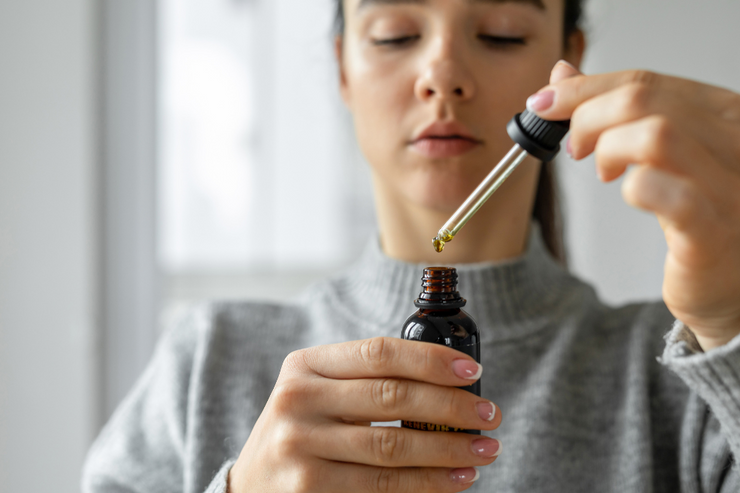CBD Dosage: How Much Should You Take?

Finding the right CBD dosage when taking CBD can be challenging, especially with products ranging from mild 5% oils to highly concentrated 3000 mg or 6000 mg options.
We strongly recommend avoiding any 3000 mg or 6000 mg concentrations until you have a firm hand on your CBD experience and know exactly what you want from it. When you first introduce CBD into your life, it's advisable to try a small number of drops with a low-strength oil.
Clinical studies show that while CBD is well-tolerated even at higher levels, therapeutic effects, particularly for anxiety and addiction, are most evident at 300 - 400 mg/day [2]. For general wellness or first-time use, starting at far lower doses is advised.
Table of Contents:[hide]
How Much CBD Should You Take When Starting Out?
For beginners, evidence supports starting with low-strength CBD oils or pre-measured gummies:
-
Start with 10–20 mg per day (e.g., a few drops of 5–10% oil).
-
Increase slowly every few days by 5–10 mg if needed.
-
Track effects such as calmness, sleep improvements, or reduced stress.
Most over-the-counter CBD users take under 100 mg/day, aligning with safe use observed in studies [2]. However, some clinical trials found higher doses (300–400 mg) provided the most consistent benefits for anxiety [2].

How Long Does CBD Stay in Your System?
How long CBD stays in your system vary based on how it’s consumed:
-
CBD oil (sublingual): Onset in 30–45 mins, lasts 4–6 hours.
-
CBD gummies or capsules: Onset in 1–2 hours, lasts 6–8 hours.
-
Topicals: Localised effects only, don’t enter the bloodstream.
Metabolism, weight, and frequency of use also affect how long CBD remains detectable, but most studies suggest it clears within 2–5 days of stopping for occasional users [1].
Try Trusted CBD Products
Shop now in our Orange County CBD sale for exclusive discounts on oils, gummies, and more. All our CBD products are lab-tested for purity, fully compliant with UK regulations, and trusted by thousands of customers nationwide. Discover premium CBD oils, gummies, and capsules crafted to the highest standards, giving you confidence in every drop.
Give our high quality CBD oil a try today!
Research
[1] – Study: A systematic review of cannabidiol dosing in clinical populations
Source: https://pubmed.ncbi.nlm.nih.gov/31222854/
Summary:
This systematic review analysed 35 clinical studies involving 1,223 participants across 13 medical conditions to evaluate CBD dosing ranges and outcomes. It found that effective doses ranged widely from <1 mg/kg to 50 mg/kg per day (approximately <62–3,100 mg/day for adults).
-
Positive outcomes: Reported in 66% of studies, particularly for epilepsy, anxiety, schizophrenia, and graft-versus-host disease. Epilepsy studies (average dose ~15 mg/kg/day) showed the strongest evidence, with consistent seizure reduction.
-
Mixed or neutral results: Seen in conditions such as Crohn’s disease, diabetes, and chronic pain, often linked to low dosing (~2–5 mg/kg/day).
-
Safety: CBD was well-tolerated across studies, with mild side effects such as drowsiness, diarrhoea, and fatigue.
-
Key insight: Higher doses generally correlated with better outcomes. However, there is a lack of pharmacokinetic data, plasma concentration reporting, and dose-ranging trials, highlighting the need for more rigorous phase III research to establish optimal therapeutic dosing.
This review underscores CBD’s wide therapeutic window but stresses the importance of more robust dosing studies and standardisation.
[2] Study: The Safety and Efficacy of Low Oral Doses of Cannabidiol: An Evaluation of the Evidence
Source: https://pmc.ncbi.nlm.nih.gov/articles/PMC9841308/
Summary:
-
Reviewed 60 interventional studies on oral CBD ≤400 mg/day (THC ≤2%).
-
Efficacy:
-
Strongest evidence for anxiety reduction at 300–400 mg/day.
-
Emerging evidence for addiction (cannabis, opioids) at 400 mg/day.
-
Mixed or weak evidence for insomnia, pain, and other conditions.
-
Safety:
-
CBD well-tolerated up to 400 mg/day; mild side effects (somnolence, headache, GI upset).
-
Rare liver enzyme elevations noted (monitor in long-term use).
-
Conclusion:
-
Low-dose CBD is safe but therapeutic effects are most evident at 300–400 mg/day.
-
More large-scale RCTs needed for lower doses (<200 mg/day) and for pain, sleep, and long-term safety.

